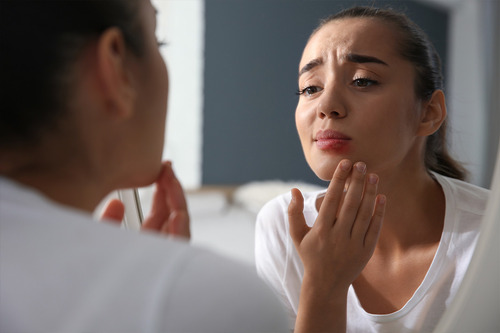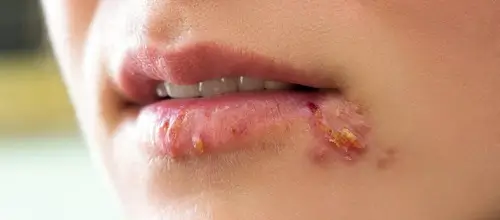
Can You Go to Dentist with Cold Sore?
Dealing with a cold sore is uncomfortable, especially if you have a dental appointment coming up. Many people wonder, “Can you go to the dentist with a cold sore?” or “should you go to the dentist with a cold” This comprehensive guide answers these questions in detail, providing insights into cold sores, their causes, symptoms, and how they affect dental visits. By understanding the implications of attending a dental appointment with a cold sore, you can make an informed decision to ensure both your comfort and safety.
What Is a Cold Sore?
A cold sore, also known as a fever blister, is a small, painful lesion caused by the herpes simplex virus (HSV). These sores typically appear on or around the lips but can also affect the gums, tongue, or roof of the mouth. Cold sores are highly contagious and often go through several stages, from tingling and itching to blistering and eventual healing.
Cold sores usually last 7–14 days, depending on your immune system and treatment. They are not only a cosmetic concern but can also cause discomfort during activities like eating, drinking, and talking.
What Are the Causes of Cold Sores?
Cold sores are caused by the herpes simplex virus (HSV), which remains dormant in the body until activated by specific triggers. The virus spreads through saliva, skin contact, or sharing contaminated items. Here are common triggers that can activate cold sores:
- Stress and Fatigue: Physical or emotional stress weakens your immune system, making it easier for the virus to reactivate.
- Illness or Fever: Conditions like colds or flu often lead to cold sore outbreaks.
- Additional Procedures: Hormonal Changes: Fluctuations during menstruation or pregnancy can trigger cold sores.
- Sun Exposure: UV rays can irritate the skin and activate dormant viruses.
- Injuries to the Mouth: Dental procedures or accidental cuts can sometimes cause outbreaks.
These triggers vary by individual, so recognizing your personal patterns is essential for managing outbreaks.
What Are the Symptoms of Cold Sores?
The symptoms of cold sores vary depending on the stage of the outbreak. Below are the most common signs:
- Tingling or Itching: Often the first sign, this stage occurs 1–2 days before a sore appears.
- Blister Formation: Fluid-filled blisters develop, often in clusters around the lips or mouth.
- Pain and Burning: The affected area may feel tender, especially during eating or talking.
- Redness and Swelling: Inflammation occurs around the sore, sometimes accompanied by a fever.
- Dry Mouth or Sore Throat: This can occur if sores spread to the inner mouth.
- Swollen Lymph Nodes: Lymph nodes in the neck or jaw may feel tender or enlarged.

These symptoms can make dental appointments challenging, especially if the sore is in an active or painful stage.
Can You Get a Cold Sore from the Dentist?
While it’s rare, there is a slight possibility of contracting a cold sore from a dental visit if hygiene protocols are not followed. The herpes simplex virus (HSV) spreads through contact with infected saliva, contaminated tools, or surfaces. However, reputable dental clinics adhere to stringent sterilization practices, making transmission extremely unlikely.
To ensure your safety, always choose a trusted dental provider and inform them of any concerns about hygiene or potential exposure to the virus.
Can I Still Attend My Dental Appointment With a Cold Sore?
This depends on several factors, including the stage of the cold sore, the nature of your dental procedure, and your comfort level. Here's a detailed breakdown:
When You Should Reschedule
- If your cold sore is in the active phase (blistering or oozing), it’s highly contagious. Rescheduling your appointment protects both you and the dental staff.
- If you are experiencing severe discomfort or pain, postponing the visit allows you to heal and attend more comfortably.
When You Can Proceed With Your Appointment
- If the cold sore is in the healing stage, there is a reduced risk of contagion. Inform your dentist beforehand so they can take appropriate precautions.
- Routine checkups and minor procedures are typically safe during the later stages of a cold sore.
How to Manage Discomfort During the Visit
- Use a topical cold sore cream or ointment to reduce irritation.
- Apply lip balm to prevent dryness during procedures.
- Take over-the-counter pain medication if needed.
How Are Cold Sores Treated?
While cold sores cannot be cured, various treatments can help manage symptoms and speed up recovery.
Cold Sore Creams or Ointments
Over-the-counter creams containing docosanol or benzocaine can relieve pain and shorten the outbreak’s duration. These are most effective when applied at the first sign of tingling or itching.
Antiviral Medication
Prescription antivirals like acyclovir, valacyclovir, or famciclovir are highly effective in reducing the severity and duration of cold sores. They are particularly useful for frequent outbreaks.
Pain Relief Medication
Non-prescription pain relievers like ibuprofen or acetaminophen can reduce swelling and discomfort.
Home Remedies
- Cold Compress: Apply a cold, damp cloth to the sore for temporary relief.
- Aloe Vera or Petroleum Jelly: These can soothe the affected area and prevent cracking.
How Are Cold Sores Spread?
Cold sores are extremely contagious, especially during the blistering phase. They spread through:
- Kissing or intimate contact
- Sharing utensils, towels, razors, or lip products
- Touching the sore and then touching your face or mouth

Dental procedures involving saliva or open sores may also carry a risk of virus transmission, which is why clear communication with your dentist is critical.
How to Prevent Cold Sores
Prevention is always better than cure. Here are some practical tips to avoid cold sore outbreaks and protect others:
- Avoid Close Contact: Do not kiss or engage in intimate activities during an outbreak.
- Practice Good Hygiene: Wash your hands frequently and avoid touching your face.
- Don’t Share Personal Items: Keep utensils, towels, and lip products separate.
- Protect Your Lips: Use a lip balm with SPF to prevent sun-triggered sores.
- Manage Stress: Incorporate relaxation techniques like meditation or yoga into your routine.
Can I Go to the Dentist With a Cold Sore?
Dealing with a cold sore while having a dental appointment on the calendar can lead to confusion and questions. The good news is that in many cases, the answer to "Can I go to the dentist with a cold sore?" is yes—but with some important considerations. Cold sores, caused by the herpes simplex virus (HSV), are highly contagious during their active stage and can sometimes complicate dental procedures if not managed carefully.
When Is It Safe to Visit the Dentist With a Cold Sore?
You can attend your dental appointment if your cold sore is in the healing stage. During this time, the blister is no longer oozing, and the risk of spreading the virus decreases significantly. However, even in the healing phase, it’s essential to communicate your condition with your dentist to ensure they take any necessary precautions.
If your cold sore is still in the active phase, where the blister is open and potentially leaking fluid, it is highly contagious. Most dentists recommend rescheduling your appointment during this phase to protect both you and their staff from exposure.
How to Prepare for a Dental Visit With a Cold Sore
If you decide to keep your dental appointment, follow these tips to ensure a comfortable and safe experience:
- Use Pain Medication: Over-the-counter pain relievers, such as ibuprofen or acetaminophen, can help reduce discomfort caused by the cold sore during your dental procedure.
- Apply a Cold Sore Cream or Ointment: Topical antiviral creams like docosanol can help reduce pain and promote healing. Apply these before your appointment, but avoid doing so immediately before your visit to prevent transferring the cream to dental tools or staff.
- Bring Lip Balm: Dental procedures often require your mouth to remain open for extended periods, which can cause dry, cracked lips. A protective layer of lip balm can reduce irritation around the cold sore and keep the area moisturized.
- Avoid Kissing or Sharing Utensils: To prevent spreading the virus, avoid intimate contact or sharing items such as cups, utensils, or towels on the day of your appointment.
- Wash Your Hands Frequently: Touching your cold sore and then touching surfaces can spread the virus. Wash your hands with soap and water regularly to protect others.
- Inform Your Dentist in Advance: Letting your dentist know about your cold sore beforehand allows them to prepare appropriately. They may take additional steps to ensure a hygienic environment and avoid irritating the affected area.
What to Expect During Your Appointment
If you proceed with your dental appointment, your dentist may take the following precautions to ensure your safety and theirs:
- Adjusting the Treatment Plan: If the procedure involves areas near the cold sore, they may modify the approach to avoid unnecessary irritation or discomfort.
- Enhanced Hygiene Measures: Dental clinics typically maintain strict sterilization standards, but they may take extra care to prevent the spread of the virus during your visit.
- Minimizing Contact: Your dentist may use tools that reduce direct contact with the cold sore area to avoid aggravating it.
Should You Reschedule?
There are situations where rescheduling your dental appointment is the best option. Consider postponing your visit if:
- The cold sore is in the blistering or oozing stage.
- You are experiencing significant discomfort that might make sitting through a procedure difficult.
- The planned procedure involves extensive work around the lips or gums, which could exacerbate the cold sore.
Always consult with your dental clinic if you’re unsure whether to proceed with your appointment. Most clinics are understanding and prioritize patient and staff safety.
How to Protect Yourself and Others
Even if your cold sore is healing, it’s essential to follow some protective measures to ensure the safety of others:
- Avoid touching your face or mouth during the visit.
- Carry tissues to dab at your cold sore if needed, but dispose of them safely.
- Keep open communication with your dentist about any discomfort you’re experiencing.
Schedule Your Appointment With Confidence
If you’re hesitant about attending your dental appointment due to a cold sore, rest assured that most dentists are equipped to handle the situation professionally and safely. Always inform them of your condition, and take the necessary steps to prepare for your visit. Proper planning can ensure a smooth and comfortable dental experience, even with a cold sore.
In summary, yes, you can go to the dentist with a cold sore, provided it’s in the healing stage and you take precautions to manage the condition. However, rescheduling is advisable if the sore is in its contagious phase. Protect yourself and others by maintaining good hygiene, applying treatments as needed, and communicating openly with your dental provider. If you’re uncertain, consult your dentist for personalized advice tailored to your situation.
Conclusion
Attending a dental appointment with a cold sore requires careful consideration of its stage, your comfort, and the type of procedure. Rescheduling is advisable for active, contagious sores, while healing sores may not pose a problem. By maintaining good hygiene and open communication with your dentist, you can ensure a safe and effective visit. Take preventive measures to minimize outbreaks and protect your oral health for the long term.

